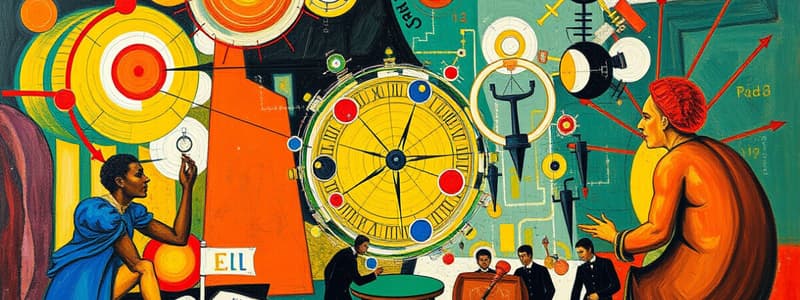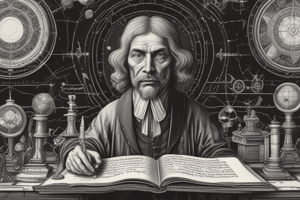Podcast
Questions and Answers
What was the Scientific Revolution?
What was the Scientific Revolution?
The Scientific Revolution was a time period (1500's-1600's) when new ideas about discovering the truth through reason, observation, and experiments challenged European beliefs.
What is the scientific method and how did it change European views about truth?
What is the scientific method and how did it change European views about truth?
The scientific method is a step-by-step process for finding the truth by observing, hypothesizing, experimenting, and repeating. It was prompted by Descartes.
Why was the Scientific Revolution a threat to traditional beliefs and the Catholic Church?
Why was the Scientific Revolution a threat to traditional beliefs and the Catholic Church?
The Scientific Revolution was a threat because it challenged traditional beliefs and allowed individuals to discover the truth for themselves.
What is reason?
What is reason?
What is the Enlightenment?
What is the Enlightenment?
How did the Scientific Revolution lead to the Enlightenment?
How did the Scientific Revolution lead to the Enlightenment?
What were John Locke's three main points about rights in government?
What were John Locke's three main points about rights in government?
How did the Enlightenment affect government?
How did the Enlightenment affect government?
Flashcards are hidden until you start studying
Study Notes
Scientific Revolution
- Occurred during the 1500s to 1600s, featuring new approaches to discovering truth.
- Challenged established European beliefs through reason, observation, and experiments.
Scientific Method
- A systematic process consisting of observation, hypothesis formulation, experimentation, and repetition.
- Influenced by René Descartes, it transformed how truth is determined in Europe.
Impact on Traditional Beliefs
- The Scientific Revolution posed a threat to traditional views and the authority of the Catholic Church.
- It empowered individuals to seek truth independently, undermining established dogmas.
Concept of Reason
- Defined as the capacity for logical thinking and understanding truth through rational analysis.
- Central to the processes of inquiry during the Scientific Revolution and Enlightenment.
The Enlightenment
- Spanning the 1600s to 1700s, it was characterized as an "age of reason."
- Applied rational thought to societal structures and governance, giving rise to new ideologies.
Link Between Scientific Revolution and Enlightenment
- The Scientific Revolution catalyzed the Enlightenment by utilizing reason and the scientific method to question and reformulate societal beliefs.
- Gave rise to challenges against both church doctrines and governmental authority.
John Locke's Ideas on Rights
- Proposed the notion of natural rights forming the foundation for government protection.
- Advocated for life, liberty, and property as fundamental rights deserving protection by governing bodies.
Influence on Modern Government
- Enlightenment ideas inspired transformative changes leading to modern democratic principles.
- Represented a shift towards governance shaped by reason and individual rights, prevalent in contemporary political systems.
Studying That Suits You
Use AI to generate personalized quizzes and flashcards to suit your learning preferences.




